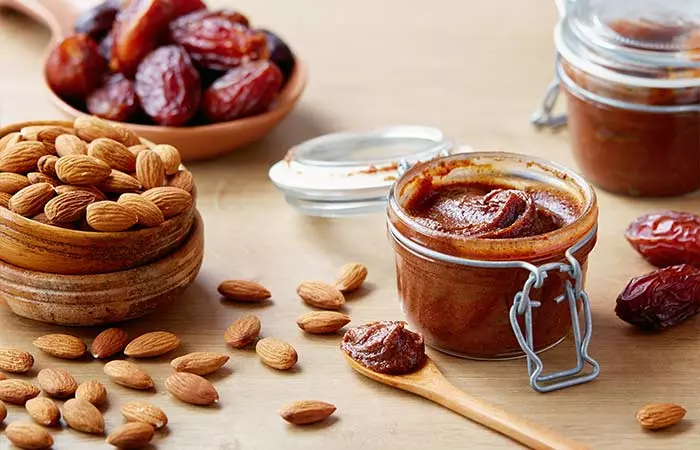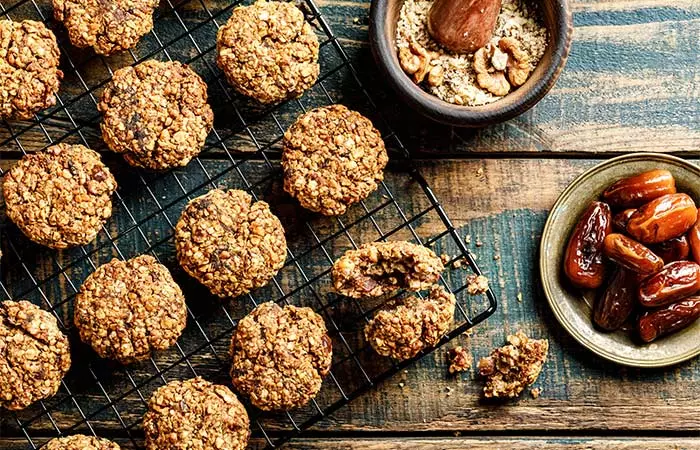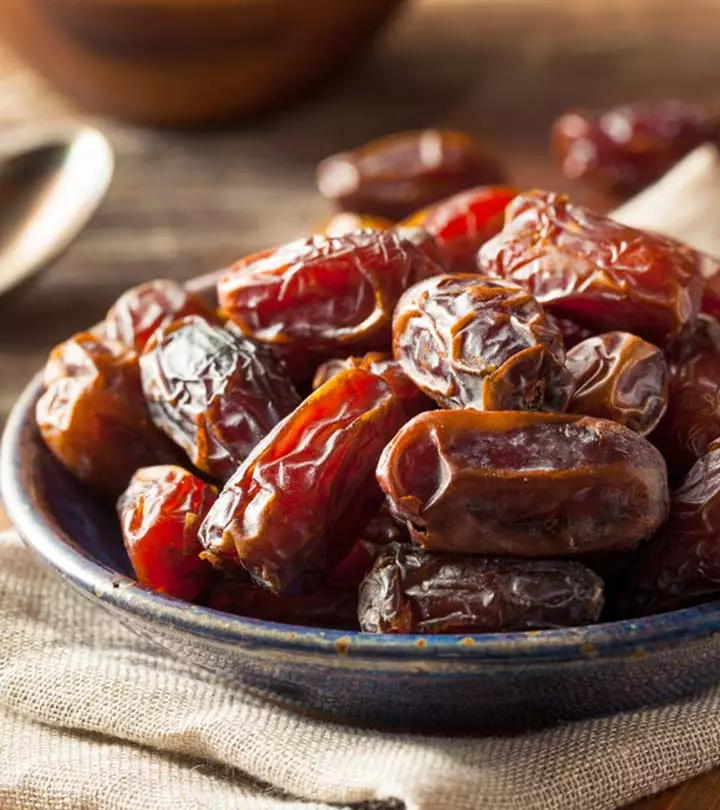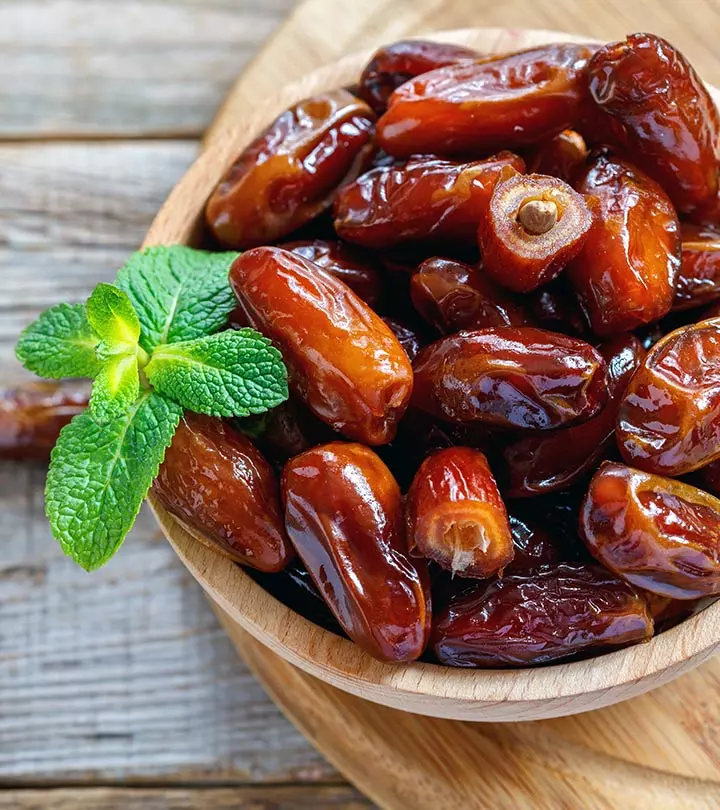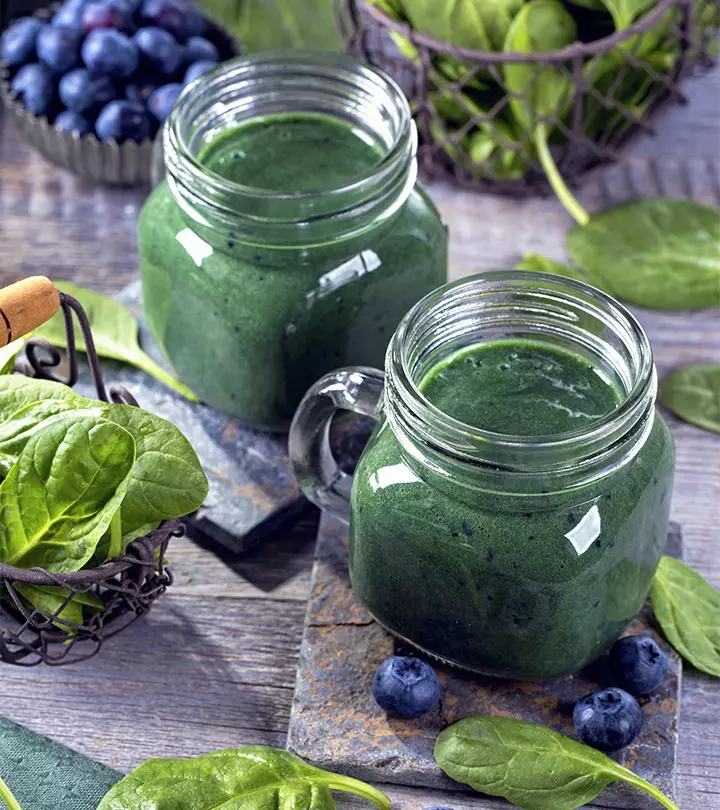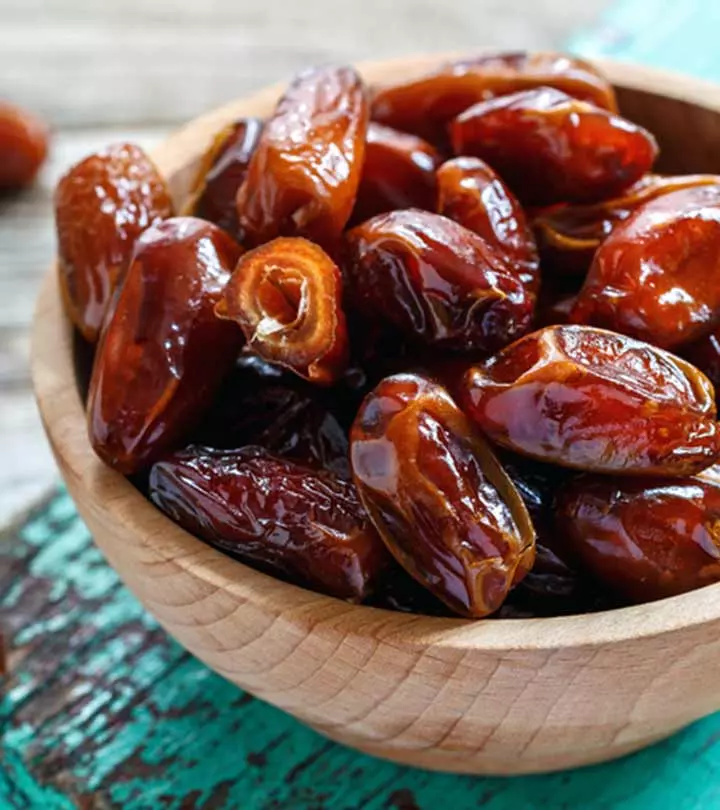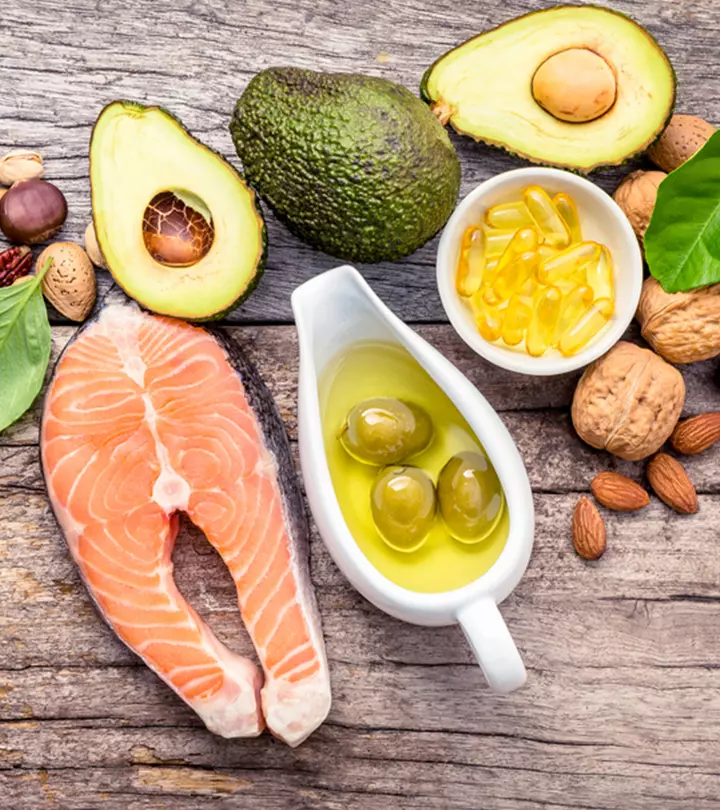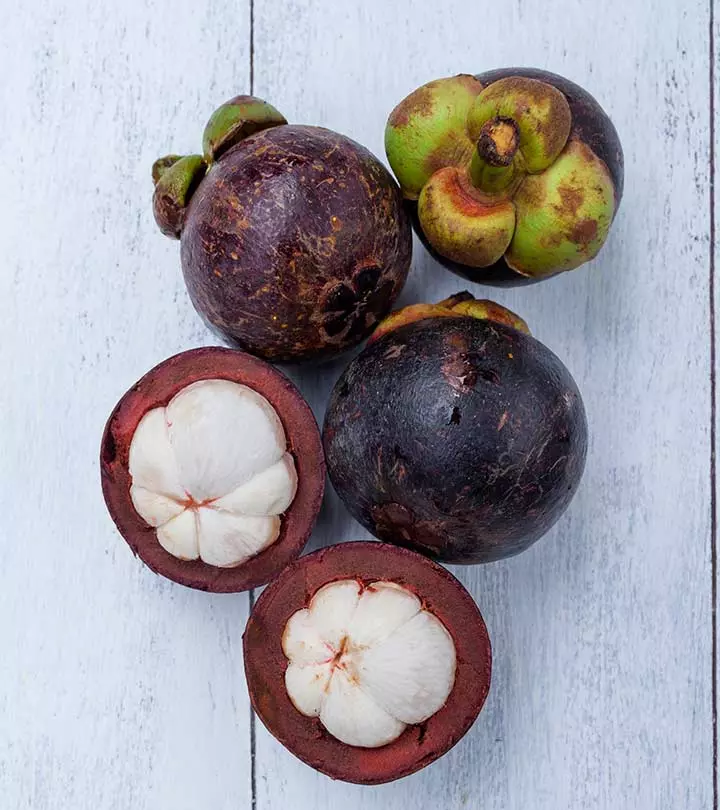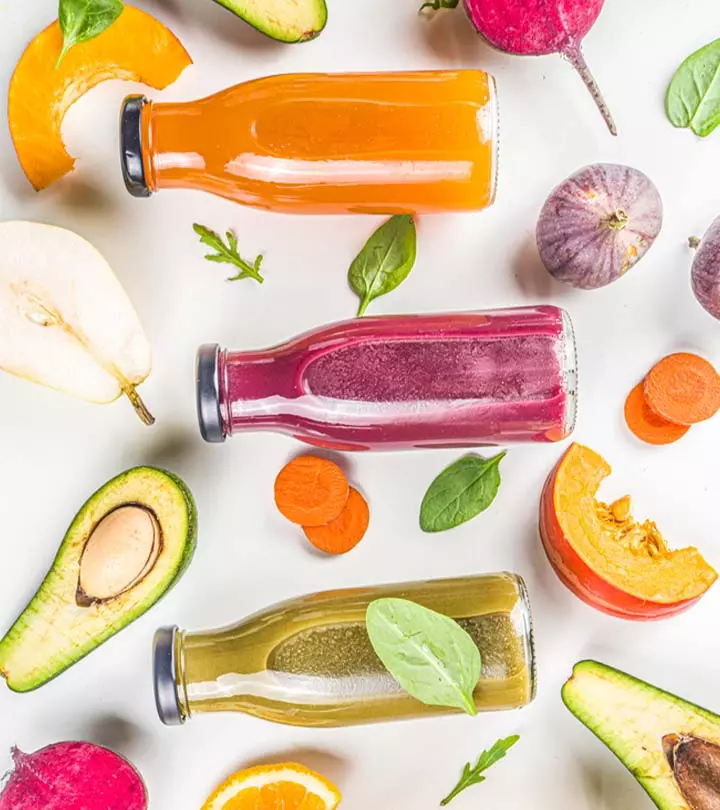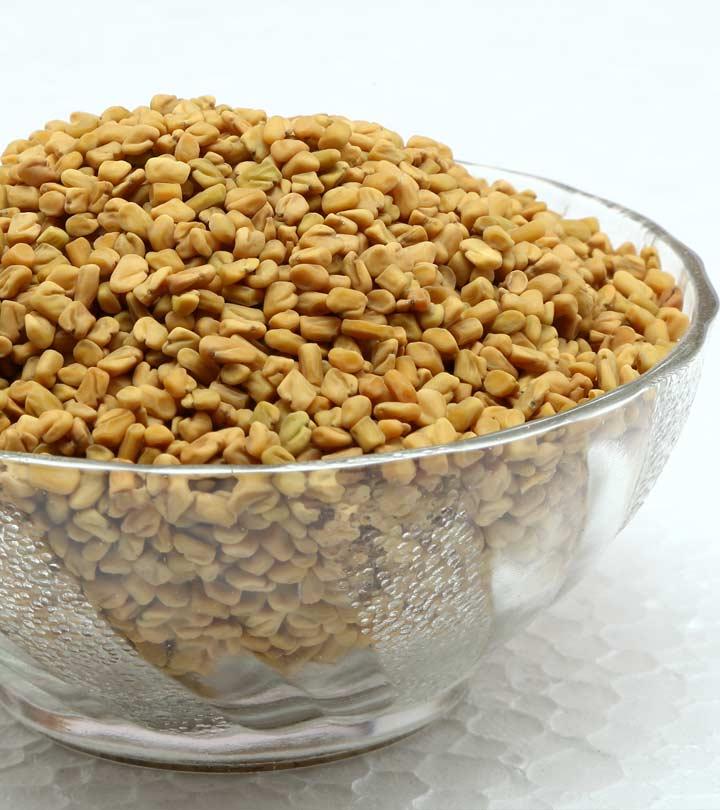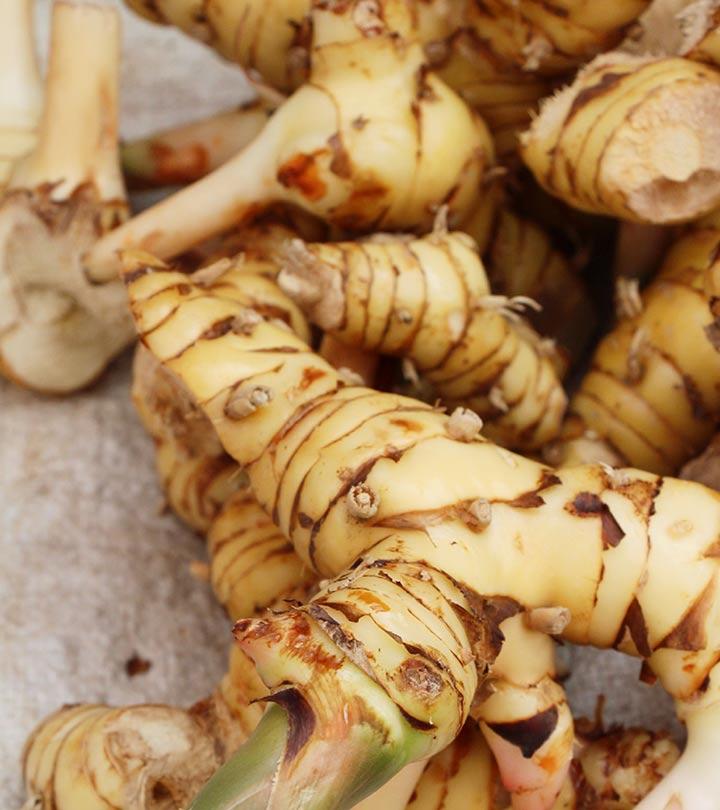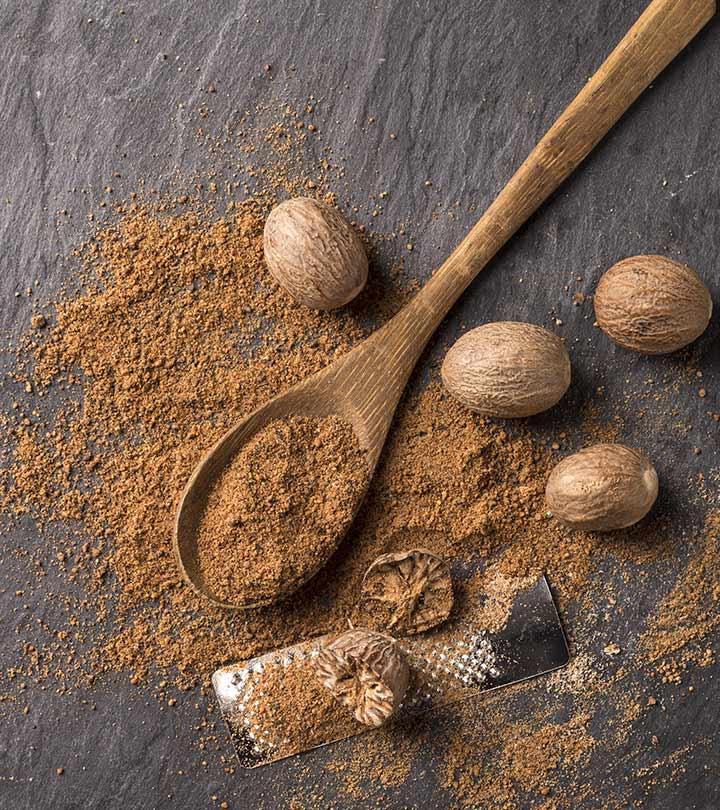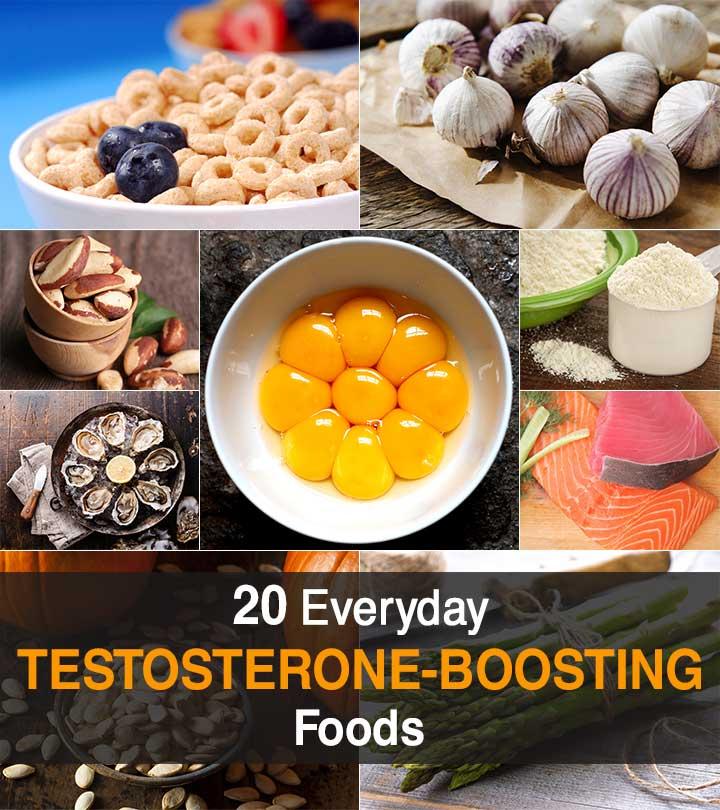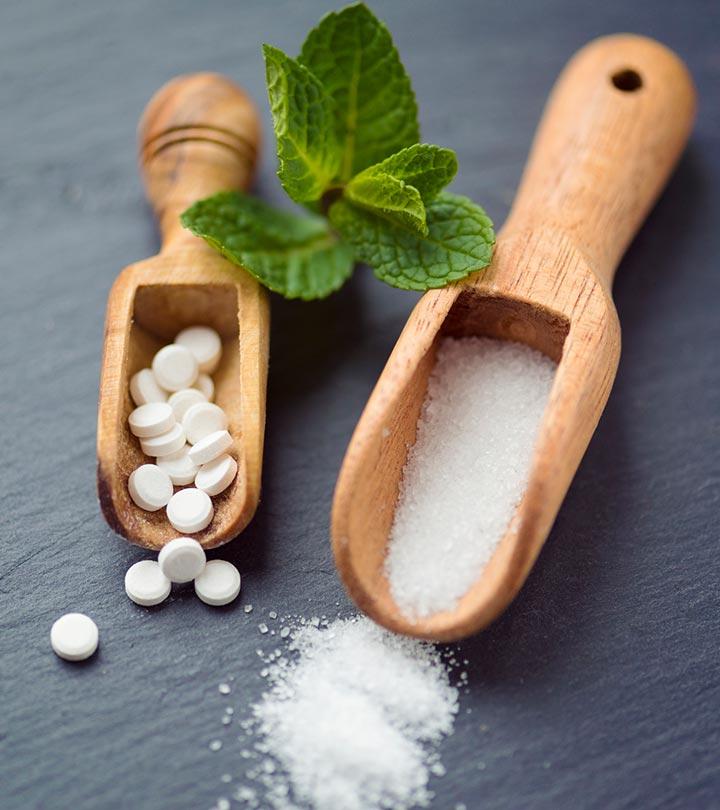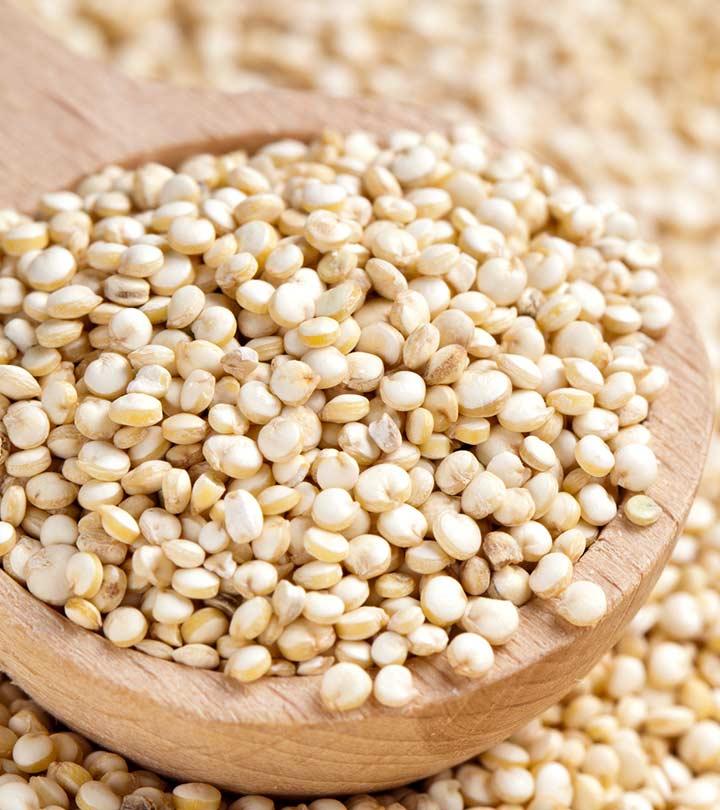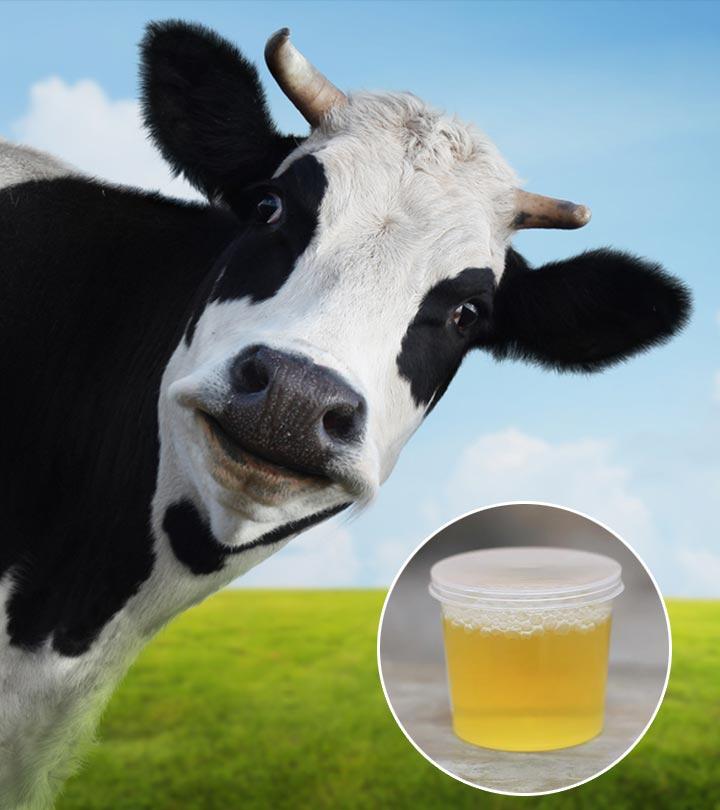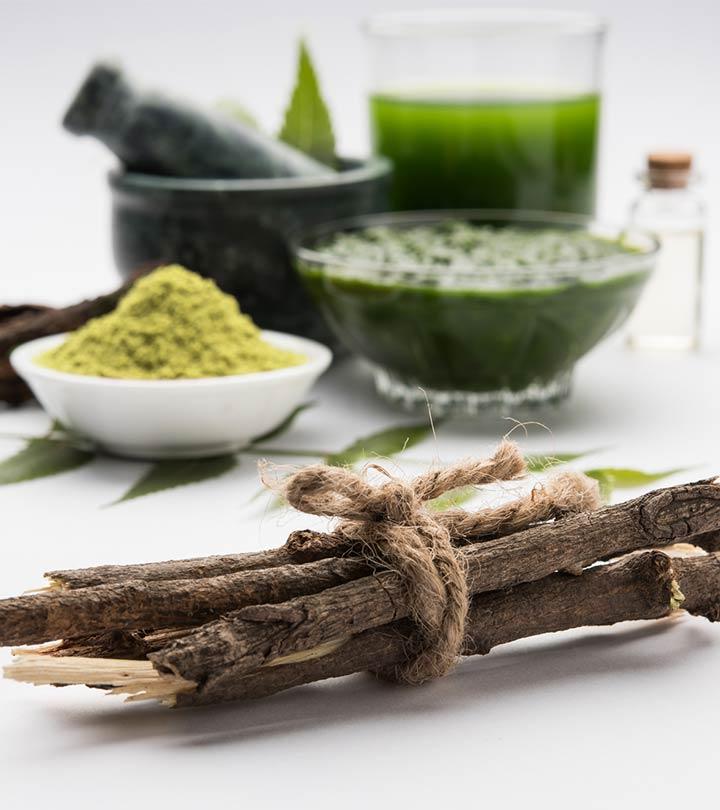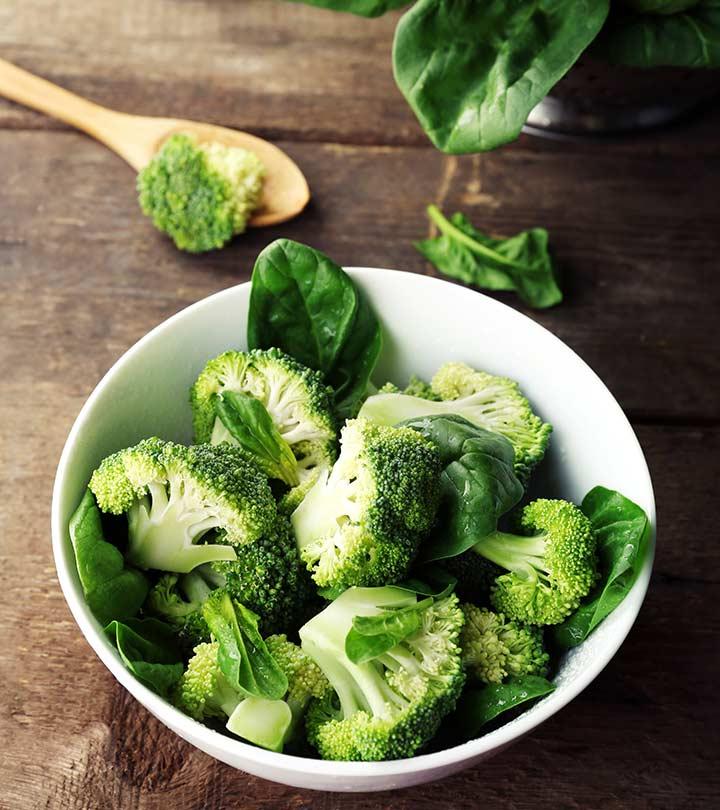Health Benefits Of Medjool Dates, Nutrition Facts, And Recipes
Antioxidant-rich natural sweet treats that can be a healthy snack or part of fulfilling meals.
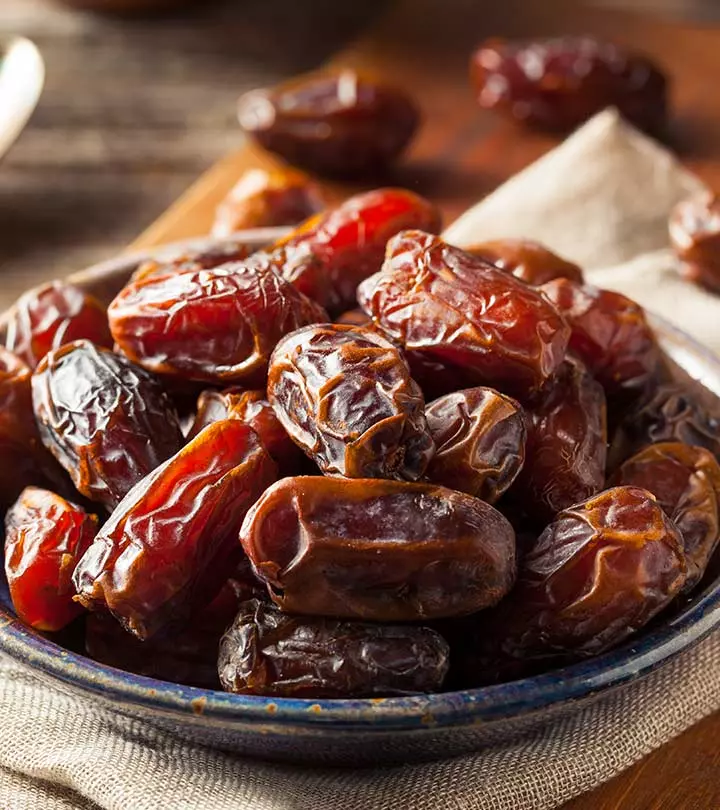
Image: Shutterstock
Medjool dates have a unique sweet flavor that resembles the taste of caramel. The health benefits of Medjool dates can be attributed to their excellent nutritional profile. They are mostly consumed in the Mediterranean diet and used as a natural sweetener. Medjool dates are dense, big, and have a soft texture. You can eat them fresh or dried. Keep reading to know more about Medjool dates, their nutritional profile, and how you can add them to your diet. Scroll down.
In This Article
What Are Medjool Dates?
Medjool dates are a premium variety of dates that are known for their large size and sweet, caramel-like flavor. They are oval-shaped, with a dark brown color and wrinkled skin. Like all date varieties, medjool dates also have a pit in the middle, surrounded by soft, nutrient-dense flesh.
While they are native to Morocco, medjool dates are also grown in the warm regions of the U.S, South Asia, Africa, and the Middle East. Fresh medjool dates usually have a soft, moist, and dense texture as these are harvested early in the ripening season. Medjool are usually sold fresh or dried, but not dehydrated, which makes them soft and sticky. As the sugar content gets concentrated as they dry, they tend to become sweeter as they age.
 Trivia
TriviaGoing further let’s have a detailed look at the nutrient content of medjool dates.
Medjool Date Nutrition Facts
With 66.5 calories in one medjool date, they are a great energy booster. As per the USDA, a single medjool date can provide you with the following nutrition (1):
| Carbohydrates | 18 g |
| Sugars | 16 g |
| Dietary Fibre | 1.6 g |
| Protein | 0.4 g |
One medjool date also provides you with many important minerals like:
| Potassium | 167 mg |
| Calcium | 15.4 mg |
| Phosphorus | 14.9 mg |
| Magnesium | 13 mg |
| Iron | 0.216 mg |
Though medjool dates are not that rich in proteins or fats, they are a great energy booster owing to their sugar content. They are also high in dietary fiber, calcium, and potassium. Medjool dates contain a significantly higher amount of calcium than other common varieties of dates and have twice as much potassium as one banana (2), (3).
Further ahead, let’s read about the sugar and calorie content of medjool dates.
Calorie And Sugar Content
Dried fruits, including dates, raisins, prunes, and dried apricots are more nutrient-dense and contain more calories per serving than their fresh counterparts because of their less water content (4). Dates are a concentrated source of natural sugars like fructose and glucose. They provide instant energy as 100g of date flesh can provide an average of 314 kcal (5).
Dates have a low glycemic index and have not been found to alter blood sugar levels significantly (6), (7). People with diabetes might still need to be careful about their intake of dates in excess as these are packed with fructose and high calories (8).
Having said that, let us now explore the various health benefits of medjool dates.
Medjool Dates Health Benefits
Medjool dates are a natural sweetener and a healthy snack option. Let’s explore its health benefits further below.
- May Help Keep Your Heart Healthy
Medjool dates are a good source of dietary fiber. Just 2 dates can provide you with over 3g of fiber. Fiber helps keep your LDL cholesterol in check and prevents clogging of your arteries, thereby reducing the risk of developing cardiovascular diseases (8), (9).
A test-tube study reported that medjool and a few other date varieties helped lower the LDL (bad) cholesterol and prevented plaque buildup in the arteries. Accumulation of plaque might clog the arteries blocking the blood flow, resulting in increased risks of stroke or heart attack (10), (11).
- Supports Healthy Digestion
Medjool dates being high in fiber, help promote healthy digestion and regular bowel motions. Sufficient fiber intake in your daily diet aids stool formation and eases constipation (12). In a study that was conducted, 21 people who ate 7 dates (168 grams) per day for 3 weeks, reported significant improvement in their bowel movement frequency (13).
- High In Antioxidants
Medjool dates contain several antioxidants that can protect your cells from oxidative damage that might lead to chronic diseases like heart disease, diabetes, cancer, and brain ailments (14).
The antioxidants in Medjool dates include carotenoids, flavonoids, and phenolic acids, which have been widely studied for their anticancer, anti-inflammatory, and brain-protective properties (15), (16). Dates are also reported to have the highest amount of antioxidants when compared to other dried fruits like prunes and figs (17).
- May Support Bone Health
Medjool dates contain a decent amount of potassium, manganese, calcium, and copper, all of which are vital in maintaining your bone health (18), (19).
With the above health benefits, and given their sweet taste and texture, let’s look at some practical ways to incorporate dates into your diet.
How To Add Medjool Dates To Your Diet
Often sold with other dried fruits, medjool dates can be found in the market all year round. These are usually sold pitted. If not, you can slice them lengthwise to remove the pit and enjoy the flesh of the dates. With their natural sweetness from fructose, they make for a healthy alternative to sugar.
 Pro Tip
Pro TipTo use it in place of sugar, you need to make a paste of the dates by blending them with water.
Usually, 2 cups of pitted dates with about 1 ¼ cups of water would give you the desired consistency. You can then use this to make smoothies, cakes, energy balls, and other sweet dishes. Apart from that, you can add dates to your diet in any of the following ways:
- Add them to sauces and milkshakes.
- Chop and add as a topping on oatmeal or cereals.
- Drizzle as a sauce over salads.
- Stuff them with peanut butter or cheese.
- Use them in pies, brownies, and tarts.
- Sweeten any homemade nut milk.
- Chop and add to balance any savory dish.
- Have 2-3 dates as a pre-workout energy snack.
- Eat as a natural dessert any time of the day.
You can keep the dates pitted and sealed in airtight containers in a cool dry place like your kitchen pantry or even in your refrigerator.
While dates make for a healthy snack and sugar substitute when eaten in moderation, there could be some possible risks associated with excess consumption of dates.
Potential Risks Of Medjool Dates
Medjool dates have high levels of certain nutrients like fructose and potassium that might be of concern to people with certain health conditions like allergies or kidney problems. You must talk to your health practitioner before adding dates to your diet. Below, let’s take a look at some of the possible risks of having medjool dates in excess.
- Weight Gain
The fiber and nutrients in medjool dates might help with weight loss and management by keeping you feeling full for longer. However, dates are very nutrient-dense and high in calories and should be eaten in moderation to avoid any unwarranted weight issues (5).
- Kidney Problems
Medjool dates are a rich source of dietary potassium. As potassium is processed in our kidneys, people with chronic kidney disease, hyperkalemia (high levels of serum potassium), or any prior kidney-related health concerns, should consult their doctor before including dates regularly in their diet (21).
- Allergies
Dried fruits often contain sulfites as preservatives. Some people might have or develop allergies to dates and other dried fruits because of their sulfite sensitivity (22). If you experience any of the known symptoms of allergy like stomach pain, bloating, skin rashes, wheezing, or diarrhea, after consuming dried fruits, you might be sensitive to sulfites and should refrain from having medjool dates.
- May Aggravate IBS
Consuming Mejool dates may pose potential risks for individuals with Irritable Bowel Syndrome (IBS). While dates are typically considered a nutritious and delicious snack due to their high fiber and nutrient content, they can be problematic for those with sensitive digestive systems, especially those with IBS. Dates contain fructose and sorbitol, natural sugars that may trigger IBS symptoms like bloating, gas, and abdominal discomfort in some people, particularly those sensitive to certain sugars (23). Additionally, the high fiber content in dates may exacerbate symptoms in those with IBS, as an excessive fiber intake can sometimes worsen bowel issues (24). Thus, individuals with IBS must monitor their diet closely, including their intake of high-fiber fruits like dates, as they can potentially exacerbate discomfort and digestive issues in susceptible individuals.
Now that you are aware of the health benefits and side effects of having medjool dates, let’s help you with a few date recipes for relishing this superfood.
Medjool Date Recipes
- Creamy Chocolate Date Mousse
Image:
Ingredients
- medjool dates (pitted) – 8-10
- light coconut milk (canned) – ½ cup
- water – ¼ cup
- avocado (ripe, peeled) -1
- cocoa powder (unsweetened) – ¼ cup
- chocolate chips (semi-sweet, melted) – ¼ cup
Instructions
- Chop the medjool dates into small pieces.
- Blend the chopped dates along with coconut milk, and water in a blender until well combined and smooth.
- Add in the avocado, cocoa powder, and melted chocolate chips.
Blend until smooth and creamy.
- Pour the mixture into four small ramekins or bowls.
- Leave them in the fridge to chill overnight or for at least 1-3 hours.
- Date, Walnut, And Dark Chocolate Cookies
Image:
Ingredients
- walnuts (finely chopped) – ½ cup
- medjool dates (diced, pitted) – ½ cup
- dark chocolate chips – ½ cup
- whole wheat flour – 1 cup
- all-purpose flour – ½ cup
- baking soda – ½ teaspoon
- egg replacer – 1-½ teaspoon
- margarine spread (soft and dairy-free, at room temperature) -½ cup
- vanilla extract – 1 teaspoon
- honey – 2 tablespoons
Instructions
- Preheat the oven to 375ºF.
- Take the margarine, honey, and vanilla in a small bowl and mix well.
- Combine whole-wheat flour, all-purpose flour, baking soda, and egg replacer in another bowl.
- Add the dry flour mixture to the margarine mixture.
- Mix and combine well to form a crumbly dough.
- Stir in the chopped dates, walnuts, and chocolate chips.
- Shape the dough into walnut-sized balls and line them 3 inches apart on a baking sheet
- Bake them for 15 minutes or until golden brown.
Soumiea, a food and photography blogger, explains different ways to have stuffed dates and why Medjool dates are her favorite. She wrote about medjool dates, “They have a lovely caramel taste to them. When I am trying to be healthy, I will actually eat dates with some coffee or tea for dessert, and it satisfies my sweet tooth. I also use dates quite a bit in my baking; however, I love them in many different forms (i).”
Discover the surprising health benefits of eating Medjool dates! Watch this insightful video and discover 10 reasons why these tasty gems are not only a source of deliciousness, but they are a nutritious powerhouse you need in your life.
The benefits of Medjool dates are numerous. They can promote heart health, support healthy digestion, and reduce the risk of cardiovascular disease, diabetes, and cancer. In addition, the vital nutrients in Medjool dates promote bone health. However, although the consumption of Medjool dates is safe, in a few, it may trigger allergies or kidney problems and cause weight gain. Hence, consuming them in moderation is ideal.
Frequently Asked Questions
How many Medjool dates can you consume in a day?
You may consume 4- 6 Medjool dates daily without any negative effects.
Are Medjool dates healthier than other dates?
Yes, Medjool dates are a healthier choice than regular dates as they have a higher calcium content.
Is it OK to eat dates every day?
Yes, it is good to eat 4-6 dates daily.
Key Takeaways
- Medjool dates contain carbs, sugars, dietary fiber, and minerals like calcium and potassium.
- They also have natural sugars and provide instant energy.
- They maintain heart health, boost digestion, are rich in antioxidants, and improve bone health.
- However, due to high potassium and fructose content, they may cause allergic reactions or kidney problems.
Personal Experience: Source
StyleCraze's articles are interwoven with authentic personal narratives that provide depth and resonance to our content. Below are the sources of the personal accounts referenced in this article.
(i) My Favorite Kind of Date: Stuffed Dates, Three Wayshttps://sugarspiceandlifeblog.wordpress.com/2019/05/16/my-favorite-kind-of-date-stuffed-dates-three-ways/
References
Articles on StyleCraze are backed by verified information from peer-reviewed and academic research papers, reputed organizations, research institutions, and medical associations to ensure accuracy and relevance. Read our editorial policy to learn more.
- Dates Medjool
https://fdc.nal.usda.gov/fdc-app.html#/food-details/168191/nutrients - PITTED DEGLET NOOR DATES
https://fdc.nal.usda.gov/fdc-app.html#/food-details/515312/nutrients - Bananas ripe and slightly ripe raw
https://fdc.nal.usda.gov/fdc-app.html#/food-details/1105314/nutrients - Nuts and Dried Fruits: An Update of Their Beneficial Effects on Type 2 Diabetes
https://www.ncbi.nlm.nih.gov/labs/pmc/articles/PMC5537788/ - Nutritional and functional properties of dates: a review
https://pubmed.ncbi.nlm.nih.gov/18949591/ - Effects of date ( Phoenix dactylifera L. Medjool or Hallawi Variety) consumption by healthy subjects on serum glucose and lipid levels and on serum oxidative status: a pilot study
https://pubmed.ncbi.nlm.nih.gov/19681613/ - Glycemic indices of five varieties of dates in healthy and diabetic subjects
https://www.ncbi.nlm.nih.gov/labs/pmc/articles/PMC3112406/ - Dietary Fiber Atherosclerosis and Cardiovascular Disease
https://www.ncbi.nlm.nih.gov/labs/pmc/articles/PMC6566984/ - Lipid Lowering with Soluble Dietary Fiber
https://pubmed.ncbi.nlm.nih.gov/27807734/ - Date (Phoenix dactylifera L.) fruit soluble phenolics composition and anti-atherogenic properties in nine Israeli varieties
https://pubmed.ncbi.nlm.nih.gov/23587027/ - Atherosclerosis
https://www.ncbi.nlm.nih.gov/labs/pmc/articles/PMC2826222/ - Effect of dietary fiber on constipation: A meta analysis
https://www.ncbi.nlm.nih.gov/pmc/articles/PMC3544045/ - Impact of palm date consumption on microbiota growth and large intestinal health: a randomised controlled cross-over human intervention study
https://pubmed.ncbi.nlm.nih.gov/26428278/ - Therapeutic effects of date fruits (Phoenix dactylifera) in the prevention of diseases via modulation of anti-inflammatory anti-oxidant and anti-tumour activity
https://www.ncbi.nlm.nih.gov/labs/pmc/articles/PMC3992385/ - Therapeutic effects of date fruits (Phoenix dactylifera) in the prevention of diseases via modulation of anti-inflammatory anti-oxidant and anti-tumour activity
https://www.ncbi.nlm.nih.gov/labs/pmc/articles/PMC3992385/ - Protective effects of flavonoids against Alzheimer\’s disease-related neural dysfunctions
https://pubmed.ncbi.nlm.nih.gov/28641164/ - Dried fruits: excellent in vitro and in vivo antioxidants
https://pubmed.ncbi.nlm.nih.gov/15670984/ - The role of nutrients in bone health from A to Z
https://pubmed.ncbi.nlm.nih.gov/17092827/ - Dietary potassium intake is beneficial to bone health in a low calcium intake population: the Korean National Health and Nutrition Examination Survey
https://pubmed.ncbi.nlm.nih.gov/28093633/ - The Effect of a Date Consumption-Based Nutritional Program on Iron Deficiency Anemia in Primary School Girls Aged 8 to 10 Years Old in Zahedan (Iran)
https://www.ncbi.nlm.nih.gov/pmc/articles/PMC6927593/ - Hyperkalemia
https://www.ncbi.nlm.nih.gov/books/NBK470284/ - Adverse reactions to the sulphite additives
https://www.ncbi.nlm.nih.gov/labs/pmc/articles/PMC4017440/ - Is Fructose Malabsorption a Cause of Irritable Bowel Syndrome?
https://www.ncbi.nlm.nih.gov/pmc/articles/PMC4729202/ - Dietary fiber in irritable bowel syndrome (Review)
https://www.ncbi.nlm.nih.gov/pmc/articles/PMC5548066/
Read full bio of Shivani Sikri
Read full bio of Ravi Teja Tadimalla
Read full bio of Himanshi Mahajan





